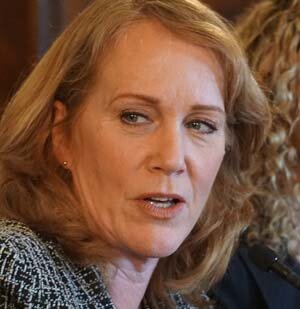Historic Investment in DD Passes RI House
/By Gina Macris
UPDATE: The Rhode Island House of Representatives approved developmental disabilities reform as part of a $14-billion state budget on a 68-3 vote June 9, sending it to the Senate.
The Rhode Island House of Representatives is expected to vote Friday, June 9, on a whopping $75 million for the state to reorganize its services for adults with developmental disabilities to comply with a federal consent decree deadline in a year’s time.
Total spending for developmental disabilities would jump from about $377.3 million to $469.1 million, an increase of about $91.8 million in an overall budget of $619.6 million for the Department of Behavioral Healthcare, Developmental Disabilities and Hospitals. Developmental disabilities spending includes about $32.4 million for a state-run network of group homes, which is receiving an increase of about $3.1 million.
The reorganization includes a wage increase for frontline workers, from an average of $19 to an average of about $22 an hour, and expanded funding for more staffing to permit all daytime services to be offered in the community.
All adults receiving support from the Division of Developmental Disabilities — roughly 4,000 individuals — will be eligible for employment-related services in addition to other assistance included in basic individual budgets.
With several federal court orders in play, the House Finance Committee voted June 2 to send the massive investment in services for adults with developmental disabilities to the full House as part of an overall $14-billion state budget.
The new developmental disabilities system, which promotes the treatment of each participating adult as a unique individual, would replace an approach that incentivized group care in day centers and sheltered workshops and depressed the wages of caregivers for a decade.
In 2014, the state accepted a federal Department of Justice finding that its system for serving adults with development disabilities violated the Integration Mandate of the Americans With Disabilities Act. Rhode Island consented to overhaul that system within ten years, a transition requiring services to be individualized and made available in the community at large which, in almost all cases, is the least restrictive environment that is therapeutically appropriate.
But the state made only incremental changes until 2021, after Chief Judge John J. McConnell Jr. of the U.S. District Court found that a decade-long shortage of workers, exacerbated by the COVID-19 pandemic, was the single biggest barrier to implementation of the consent decree.
With average wages then hovering around $13.18 a year, McConnell issued an order in January, 2021, saying the state must raise the minimum wage for direct care workers to $20 an hour by 2024. But the needle did not move until the judge issued another order requiring the state to negotiate with private service providers and families operating their own programs to arrive at an interim pay increase in the forthcoming state budget.
The General Assembly raised the minimum wage to $15.75 an hour on July 1, 2021 and then to $18 an hour effective July 1, 2022. The budget up for the House vote tonight would raise the minimum wage to $20 an hour, the last step in complying with McConnell’s court order.
Other court orders resulted in a rate review of the entire developmental disabilities system and an initiative to attract new workers to better-paying and more career-oriented jobs in caregiving, among other things.
There appears to have been ongoing negotiations between the ,court and the state on the budget continuing as late as April, when Governor Dan McKee amended his original proposal and asked the General Assembly for more money to fund 100 percent community-based care instead of 60 percent. Until then, the plan was to continue offering 40 percent of services in group day care centers, an approach which is less staff-intensive than providing individual outings in the community.
Still to be answered is whether the state, through its private service providers, can translate the expanded funding into a smooth-running inclusive new system of services in time to meet the consent decree deadline of June 30, 2024.
The director of the trade organization for most private service providers has asked the public to urge their legislators to support funding not only for adults with developmental disabilities but also for vulnerable children.
The trade organization, the Community Provider Network of Rhode Island (CPNRI), is part of a coalition of organizations supporting an estimated 100,000 people eligible for various home and community-based services that have experienced the same labor shortages as the sector focused on adults with developmental disabilities.
Companion bills in the House and Senate would allocate $200 million of federal-state Medicaid funding to shore-up home and community-based services statewide during the coming year while the state’s health insurance commissioner completes a rate review similar to the one conducted for developmental disabilities. Those bills have not advanced.
The CPNRI director, Jenna Husted, applauded the “major investments in adults with disabilities and those that support them.”
“We are, however, concerned about the lack of investment in children with disabilities. Providers of children with disabilities are facing unique challenges and it is our responsibility to provide them the necessary support to thrive.
“We urge legislators to protect the major investment in adults with disabilities, and include investments for children with disabilities,” Husted said. “Together, we will become a more inclusive State.”
The House session is expected to begin at 2:30 p.m., according to the House Calendar.













